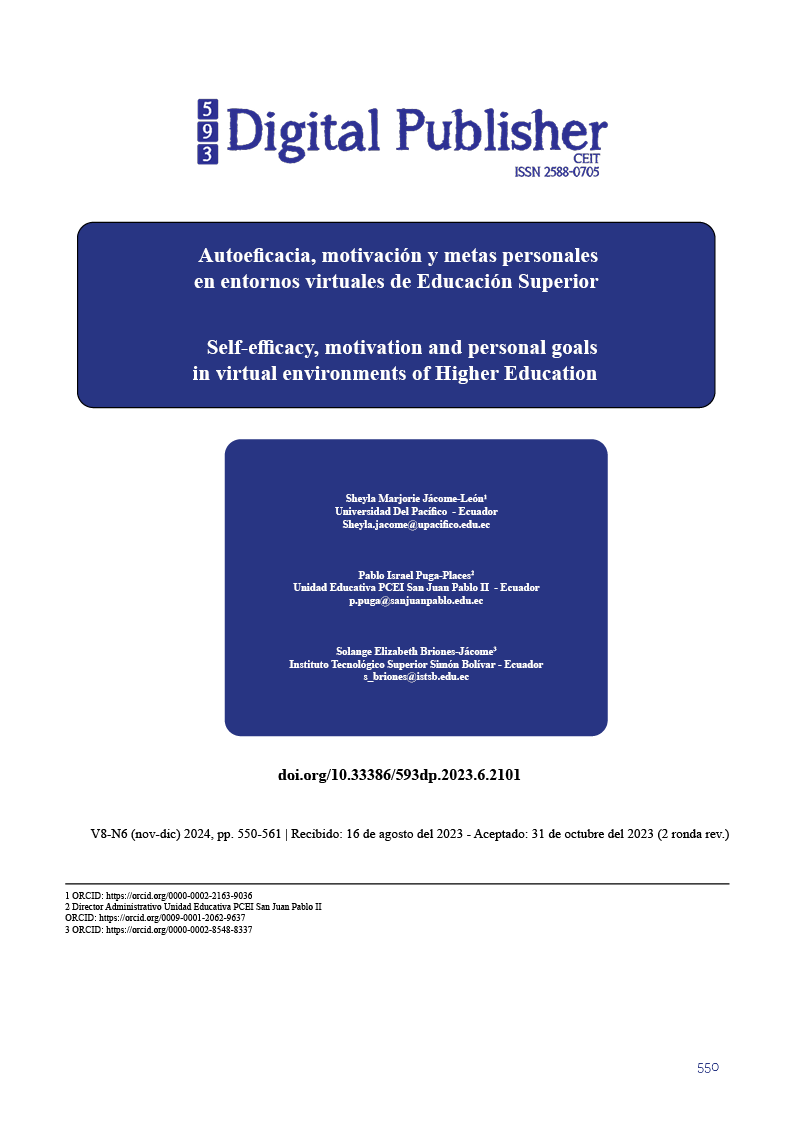Self-efficacy, motivation and personal goals in virtual environments of Higher Education
Main Article Content
Abstract
Self-efficacy, motivation, and personal goals are key factors for academic success, since they mutually influence each other and determine the level of student engagement, satisfaction, and performance in Higher Education virtual environments, which are characterized by flexibility, autonomy, and technology-mediated interaction. Therefore, this research proposes the evaluation of these theoretical factors of self-regulated learning based on the social cognitive theory of Bandura (1977) through the Self-regulated Online Learning Questionnaire of Barnard, Lan, To, Osland, & Lai (2009) to a sample of 102 participants, including undergraduate and graduate students and teachers from universities in Guayaquil, Ecuador. In the results, the factors "Form of Study", "Self-evaluation" and "Emotions and Feelings" showed greater consistency in relation to the sample studied, which reflects a higher development of self-regulatory skills in students in virtual environments in terms of the process of evaluating their own performance, comparing their real performance with their objectives and the motivational processes to achieve them.
Downloads
Article Details

This work is licensed under a Creative Commons Attribution-NonCommercial-ShareAlike 4.0 International License.
1. Derechos de autor
Las obras que se publican en 593 Digital Publisher CEIT están sujetas a los siguientes términos:
1.1. 593 Digital Publisher CEIT, conserva los derechos patrimoniales (copyright) de las obras publicadas, favorece y permite la reutilización de las mismas bajo la licencia Licencia Creative Commons 4.0 de Reconocimiento-NoComercial-CompartirIgual 4.0, por lo cual se pueden copiar, usar, difundir, transmitir y exponer públicamente, siempre que:
1.1.a. Se cite la autoría y fuente original de su publicación (revista, editorial, URL).
1.1.b. No se usen para fines comerciales u onerosos.
1.1.c. Se mencione la existencia y especificaciones de esta licencia de uso.
References
Aprilia, A., Masyithoh, S., & Sam, M. (2021). The effect of learning culture on self-efficacy of special intelligent students in senior high school. Jurnal EDUCATIO, 7(2), 105-112. doi:http://dx.doi.org/10.29210/1202121133
Bandura, A. (1977). Self-efficacy: Toward a unifying theory of behavioral change. Psychological Review, 84(2), 191-215. doi:https://doi.org/10.1037/0033-295X.84.2.191
Bandura, A. (1993). Perceived self-efficacy in cognitive development and functioning. Educational Psychologist, 28(2), 117-148. Obtenido de https://educational-innovation.sydney.edu.au/news/pdfs/Bandura%201993.pdf
Barnard, L., Lan, W., To, Y., Osland, V., & Lai, S. (2009). Measuring self-regulation in online and blended learning environments. Internet and Higher Education, 12(1), 1-6. doi:https://doi.org/10.1016/j.iheduc.2008.10.005
Fabrigar, L. R., Wegener, D. T., MacCallum, R. C., & Strahan, E. J. (1999). Evaluating the use of exploratory factor analysis in psychological research. Psychological Methods, 4(3), 272-299. doi:https://psycnet.apa.org/doi/10.1037/1082-989X.4.3.272
Ferreira, M., Marques Tavares, W., Goulart Ferreira, D., Marinho Araújo, I., da Silva Filho, O., & Janes Carneiro, T. (2023). Psychometric properties of a physical self-efficacy perception scale in the light of cognitive social theory. Social Sciences & Humanities Open, 7, 1-9. doi:https://doi.org/10.1016/j.ssaho.2023.100423
Hendrickson, A. E., & White, P. O. (1964). PROMAX: A quick method for rotation to oblique simple structure. British Journal of Statistical Psychology, 17, 65-70. doi:10.1111/j.2044-8317.1964.tb00229.x.
Jun Hui Tan, F., Oka, P., Dambha Miller, H., & Chuan Tan, N. (2021). The association between self-efficacy and self-care in essential hypertension: a systematic review. BMC Family Practice, 22(44). doi:https://doi.org/10.1186/s12875-021-01391-2
Lefrançois, G. R. (2012). Learning theories. . Sâo Paulo: Cengage Learning.
Lloret Segura, S., Ferreres Traver, A., Hernández Baeza, A., & Tomás Marco, I. (2014). El Análisis Factorial Exploratorio de los Ítems: una guía práctica, revisada y actualizada. Anales de Psicología, 30(3), 1151-1169. doi:https://dx.doi.org/10.6018/analesps.30.3.199361
Pinto Santubera, C., Ortiz Salgado, R., Muñoz Mendoza, C., Yáñez Alvarado, M., & Letelier Sanza, P. (2020). Cuestionario de autorregulación del aprendizaje en línea (Online Self-regulated Learning Questionnaire, OSLQ): estudio de validez y fiabilidad de la versión en español. Estudios Pedagógicos Valvivia, 46(2), 251-266. doi:http://dx.doi.org/10.4067/S0718-07052020000200251
Putri, W., & Prabawanto, S. (2019). The analysis of students' self-efficacy in learning mathematics. Journal of Physics: Conference Series, 1157(3), 1-8. doi:10.1088/1742-6596/1157/3/032113
Schunk, D. H. (1984). Self-efficacy perspective on achievement behavior. Educational Psychologist, 19(1), 48-58. doi:https://doi.org/10.1080/00461528409529281
Watkins, M. (2018). Exploratory Factor Analysis: A Guide to Best Practice. Journal of Black Psychology, 44(3), 219-246. doi:https://doi.org/10.1177/0095798418771807
Zimmerman, B. (1994). Dimensions of Academic Self-Regulation. En D. Schunk, & B. Zimmerman, Self-regulation of Learning and Performance (1st ed., pág. 19). New York: Routledge. doi:https://doi.org/10.4324/9780203763353
Zimmerman, B. J. (1989). A social cognitive view of self-regulated academic learning. ournal of Educational Psychology, 81(3), 329–339. doi:https://psycnet.apa.org/doi/10.1037/0022-0663.81.3.329




